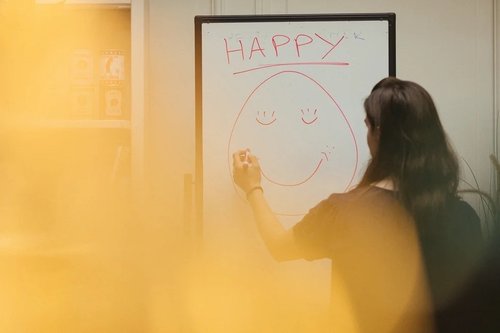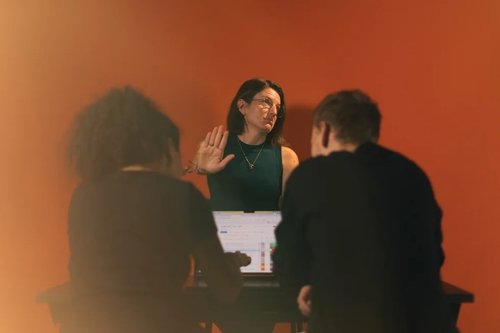I lost my job...and with it my whole identity
Jun 01, 2021
5 mins


Journalist
The lines between work and home may be blurred, but many of us still see our jobs as a key part of our identity. So what happens when the job is no longer there? Who are we if we are not what we are paid to do? We find out how three people coped with losing posts that they loved and that they felt defined them.
Ellie Grout had wanted to be a teacher since she was four years old. After college, she completed a Post-Graduate Certificate in Education (PGCE) course. Soon she started work in a secondary school teaching English. “My mum always pulls out this anecdote of me being asked what you want to be when you’re older. I said ‘teacher’ and that just never changed,” she said. The job was everything she had hoped it would be. “I loved it. I liked building relationships with students, colleagues, with families. And I used to love planning lessons and schemes of work,” she said. “I never questioned that decision to train to teach.”
Grout was so dedicated to her job that she began working in the evenings and at weekends planning and marking homework. It took its toll. “I got to a point where I was a shell of a person really. I was living to work,” she said. As the pressure increased, she was signed off with stress twice. The second time came after she had handed in her notice. After dreaming of being a teacher her whole life and then being one for seven years, suddenly she wasn’t one anymore. “I’m not really someone who cries very much, but I cried a lot,” she said. “It was devastating.”
What our jobs mean to us
In the US, 55% of workers get a sense of identity from their jobs, according to Gallup’s annual Work and Education survey, rising to 70% of college graduates. Those figures have been largely consistent for the past 30 years. Although the culture may be different in the UK, the sentiment is similar. A 2020 survey from Jobsite shows that three-quarters of UK employees expect to find “a job they truly love” in their lifetimes. Clearly our work is not just what we do, but a significant part of who we are. So what happens when we leave a job that defines us? Or are let go?
Eddie Howland, from Brighton, found it painful. Howland works in a builders’ merchants by day, but by night he used to act as a photographer for local fire stations. For almost three decades, he photographed incidents in dangerous conditions covering all fire services in West Sussex. He was proud to see his photographs used by the services and by national news outlets. “It was my passion,” he said.
He likens being told his contract would not be renewed to getting dumped. “It was a great shock. It was like my life’s work was gone,” he said. Howland says he felt “abandoned”. When the fire service sent him a certificate commemorating the work he had done for it, he threw it in the bin.
When the sector is in freefall
Being let go is doubly hard, according to a 2017 study. Not only have you lost a role, but it also means switching to an identity with negative associations: unemployed. Researchers found that even the possibility of unemployment posed a threat to one’s “social identity”. Those who felt secure reported higher levels of well-being and were less likely to think of their jobs as a significant part of their identity. If the job was threatened, however, they were more likely to feel that having that job was a big part of who they were.
Holly Sharp was let go from her role in marketing and production for an arts center in Manchester after being put on furlough in 2020. It wasn’t just her job that had gone, however, the whole arts sector was in freefall as a result of the pandemic. Between March and December 2020, an estimated 55,000 jobs in the arts were lost. Sharp was thrown into a highly competitive jobs market. She said, “It wasn’t so much even getting rejections, I just wouldn’t hear anything because they were so overwhelmed with job applications.”
She was living alone in lockdown and the lack of response was hard to bear. “You’re just completely on your own on this little island. And you’ve lost a job. You just feel completely invisible.” Sharp, who had worked in the arts for seven years since leaving college, had been happy. She hadn’t seen it coming. She said, “I just felt bereft. What do you do when you’ve spent all your adult life working in the same industry, and then that’s taken away from you, and there’s not any option to get back into it?” she said.
Recognising that lightbulb moment
One day Sharp, who had always loved dogs, was helping a friend to walk hers when the friend suggested she become a dog groomer. “It was pretty much a lightbulb moment,” she said. “I thought, actually, that’s a really good idea. Why don’t I do that?” She has since begun training to be a groomer.
For Grout, the process of finding a new direction has been slower. It wasn’t until some months after she had left teaching that she began to imagine a future outside the classroom. “I sort of thought, this is quite liberating––and more so than scary,” she said. She signed up with tutoring agencies online and started to experiment with new interests. She wrote a children’s book, bought a badge maker, began to make badges, and started to attend educational conferences. Grout applied to speak at a conference on a niche topic she was passionate about: educational transitions. These are the big changes in routine during education such as moving from primary to secondary school.
Now, educational transitions have become a significant part of her job. She co-runs a conference on the subject, produces a quarterly magazine, and has just started a podcast. She still works as a tutor, is starting a charity, and also does communications work for a local school. Where previously Grout defined herself by one job, now she has many roles. She said, “I’ve said to people recently, when they ask ‘What do you do?’ –– ‘Whatever I want!’ ”
Trying to forge a new identity
It is not always obvious when or how you can bounce back. For Howland, the hurt is still fresh. “It was hard to move on and I probably haven’t,” he said. After losing his job he contracted Covid-19 and didn’t pick up a camera for over a year. Recently he has started taking wildlife photos though he doesn’t see this as a future career path.
Sharp wonders if she will miss her old job and her old identity, as the arts open up again. Her friends send her adverts for roles in theater, but she thinks it might be better to make a clean break. “I think there’s a chance I’ll be happier,” she said. “I thought that things couldn’t really get any worse, but now it’s all turned around and looking quite hopeful. Now I’m going to spend the rest of my working life surrounded by dogs.”
Photo: Welcome to the Jungle
Follow Welcome to the Jungle on Facebook, LinkedIn, and Instagram, and subscribe to our newsletter to get our latest articles every day!

More inspiration: Our relationship with work

Advice for people pleasers: Breaking free from being “too nice” at work
Do you often say things like, "Yeah, sure, I can do that!" when in fact you don't have the bandwidth to do that? We've got you.
Dec 12, 2024

There’s no place like home: Does relocation hurt productivity?
Relocating often brings homesickness, but it’s part of the journey. Here’s how to embrace the change and make the most of it.
Oct 22, 2024

Should you take your office crush to the next level?
Is an office crush worth the risk, or more damaging to your career and reputation than you think?
Oct 09, 2024

Young workers on unpaid internships: Was it worth it?
While internships build skills and connections, unpaid ones can limit opportunities for those who can't work for free. Is it fair?
Sep 12, 2024

Sleeping less to succeed more: Do CEOs sleep as little as we think?
In today's fast-paced corporate world, a common belief is that successful leaders, particularly CEOs, need less sleep to achieve their goals.
Aug 26, 2024
The newsletter that does the job
Want to keep up with the latest articles? Twice a week you can receive stories, jobs, and tips in your inbox.

Looking for your next job?
Over 200,000 people have found a job with Welcome to the Jungle.
Explore jobs